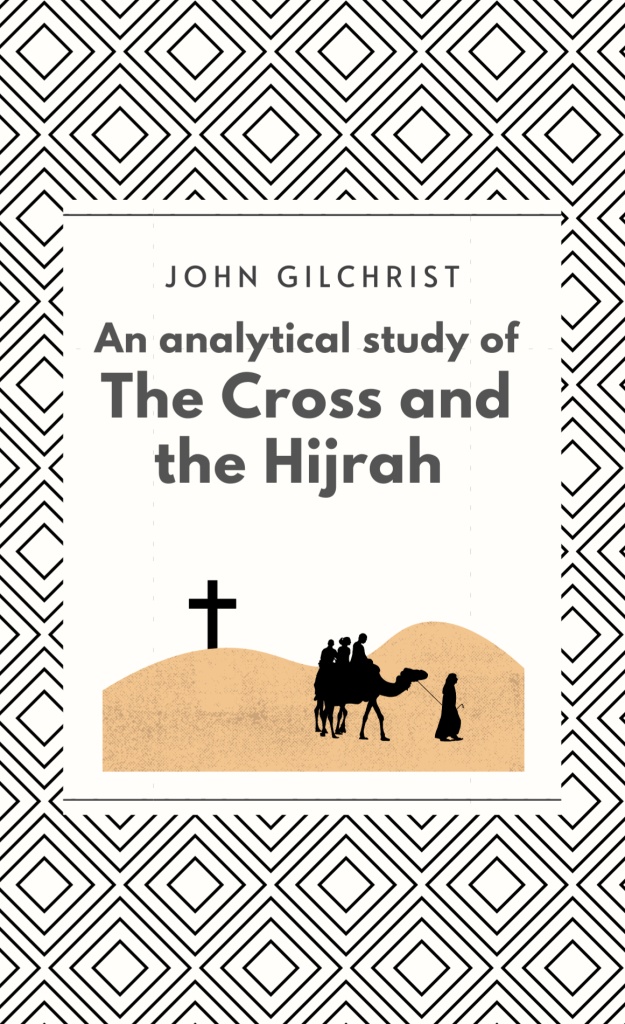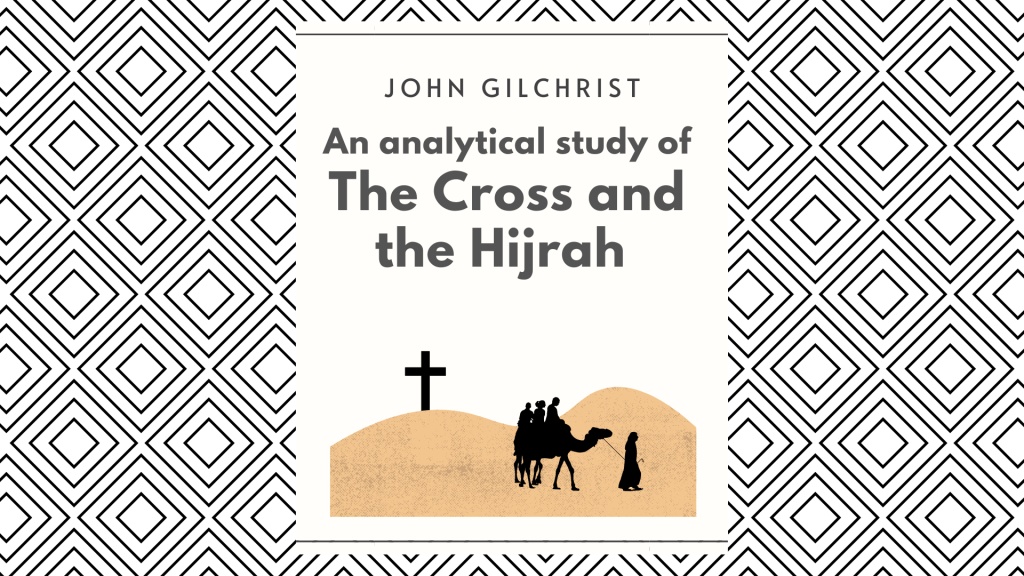The Cross - the Choice of the Saviour of the World
An Analytical Study of the Cross and the Hijrah


Chapters
- Introduction
- The Similarities between Jerusalem and Mecca
- The Opposition to Jesus and Muhammad
- The Ways of Escape Before both Men
- Muhammad and the Ummah at Medina
- The Contrasting Path Chosen by Jesus Christ
- The Cross - the Choice of the Saviour of the World
- The End Result: the Glorious Kingdom of God
« Ch. 6 - The Contrasting Path Chosen by Jesus Christ
On the night that Jesus was arrested the hatred of those who sought to destroy him was finally given an opportunity to express itself. The Jewish leaders, who were his sworn enemies, immediately took steps to have him put to death and within less than twenty-four hours he was nailed to the cross. His disciples were shattered. They "had long hoped that he was the one to redeem Israel" (Luke 24:21) and, in this moment of apparent defeat, it appeared that all was suddenly lost. His enemies were jubilant. At last they had him in their power and were determined to see him put to death before their very own eyes.
As Jesus hung on the cross he seemed to be a failure. All his labours appeared to have been in vain. While the hijrah had taken Muhammad from the depths of disconsolation to the prime of success, the cross took Jesus to an early grave. It was all so sudden and unexpected. It had seemed that the chief priests could do nothing to withstand him. Suddenly they had laid hold of him and had arranged a swift execution.
What went through the mind of Jesus at this point? Did he regret not taking the many opportunities he had enjoyed to escape from the Jews? Did he look back on the occasion a few days earlier when the Greeks had desired to talk with him and wish he had hearkened to them? Did he despair in the sudden horror of all that had befallen him? Did he curse his enemies in his heart for achieving what they had so long sought?
Not one of these thoughts entered his mind. Shortly after he was crucified he spoke from the cross and he prayed in these words:
"Father, forgive them, for they know not what they do". -- Luke 23:34
The crucifixion did not catch Jesus by surprise at all. He had often predicted that he would be crucified (Matthew 17:23, 20:19) and as the time approached he spoke of it as his "hour" (John 12:27). On the night of his arrest he plainly told his disciples that he was about to be betrayed (John 13:19) and in everything he said during his arrest, trial and crucifixion we find him reacting without surprise to the events that were rapidly unfolding against him.
He spoke of this hour as the moment which he had anticipated and as the one in which he was to be "glorified" (John 12:23; 13:31). He looked toward it as the climax of the glorious work he had been sent to fulfil. He did not view it as a sudden disaster that he should have anticipated and fled from in hijrah fashion, he saw it as his moment of glory, as the occasion he had long awaited when the fulness of his love was finally to be revealed. The moment had come for him to achieve what he had long been constrained to accomplish (Luke 12:50).
He did not cry out from the cross in despair, nor did he curse those who had condemned him. He prayed that they might be forgiven. He was willing to suffer in their place and be consumed that they might be forgiven. He died so that his enemies might live. He revealed the perfection of his Father's love for those who hated him by enduring on the cross the penalty that was due to them for their sins. In his crucifixion he gave the ultimate proof of God's love for wayward sinners.
Jesus Christ chose the opposite path to that chosen by Muhammad. The cross was the antithesis of the Hijrah and its objectives were the opposite of those sought in the escape from Mecca. Muhammad fled his enemies only to engage in battle with them and slaughter them so that he and his companions might live. Jesus made no attempt to escape from his enemies that fateful night but gave himself up for them and died that they might live.
When God called on Abraham to sacrifice, he tested him to see whether he loved him so much that he would give his very own son for him. When this same God, the eternal Father, willingly gave his own Son for the human race and took the initiative in securing the forgiveness even of his enemies, he manifested to the full his love for mankind. Muhammad willingly destroyed those whom he considered to be the enemies of God, but in Jesus Christ God willingly forgave those whom he knew to be his own enemies so that they might live instead.
In this the love of God was made manifest among us, that God sent his only Son into the world, so that we might live through him. In this is love, not that we loved God, but that he loved us and sent his Son to be the expiation for our sins. -- 1 John 4:9-10.
From an earthly point of view it may yet appear that Muhammad's decision to flee his enemies was a wiser one than the decision of Jesus to passively give himself up to them. After all, Muhammad's decision was the turning-point in his mission. Twelve years of frustration in Mecca were soon to be forgotten as the Islamic ummah was established at Medina and as Muhammad grew in power and authority. Successes became increasingly regular and in the end he was able to return to Mecca with an overwhelming force and conquer his enemies. At the time of his death he had subdued virtually the whole of the Arabian Peninsula. Did he not die in peace, beholding the triumphs of his mission?
After only three years ministry Jesus was suddenly apprehended and put to an untimely death in what was generally considered to be a shameful and disgraceful manner. His small band of disciples deserted him and his enemies gloated over him in triumph. Did not his life, in contrast with Muhammad's, end in miserable defeat and apparent disaster?
As he hung on the cross, two thieves who were crucified with him began to mock him with the Jewish leaders for claiming to be the Messiah (Matthew 27:44). After a while one of them again reviled him, calling on him to come down from the cross and save them if he really was the Messiah. It was to be the last temptation from Satan to Jesus to express himself as a worldly Messiah and make a public display of his real authority and conquer all his enemies. At this late hour, however, the other thief finally repented and had a change of heart. He said to his fellow criminal:
"Do you not fear God, since you are under the same sentence of condemnation? And we indeed justly; for we are receiving the due reward of our deeds; but this man has done nothing wrong". -- Luke 23:40-41
But what good would such repentance do at this moment for a hardened criminal who had done no good in his life at all and was now only a short while from death? With his hands and feet nailed to the cross, what could this enemy of God do to redeem himself, one who not an hour earlier had heaped abuse on the Anointed one of God? In his moment of helplessness and complete demoralisation he said to Jesus:
"Jesus, remember me when you come in your kingly power". -- Luke 23:42
He finally perceived that the crucifixion of Jesus was not a sudden defeat but the very purpose for which he had come into the world and in penitence asked only to be remembered, even as the most undeserving of sinners and least of men, the last man who might hope to enter the kingdom of heaven. Jesus immediately replied:
"Truly I say to you, today you will be with me in Paradise". -- Luke 23:43
A faint hope that he might yet obtain access to the kingdom of God as the last man in was transformed in a moment into a full assurance that he would be the very first man to die after Jesus Christ in true faith and walk with him that very day into Paradise!
The Hijrah opened the way for Muslims on earth to obtain temporary security in the ummah of Islam. The cross opened the way for all true followers of Jesus to obtain eternal life in the kingdom of God. Apparent defeat was about to be transformed into glorious victory. At first glance the Hijrah might appear to have been a wiser choice than the cross. When viewed in perspective, however, the opposite turns out to be the case.